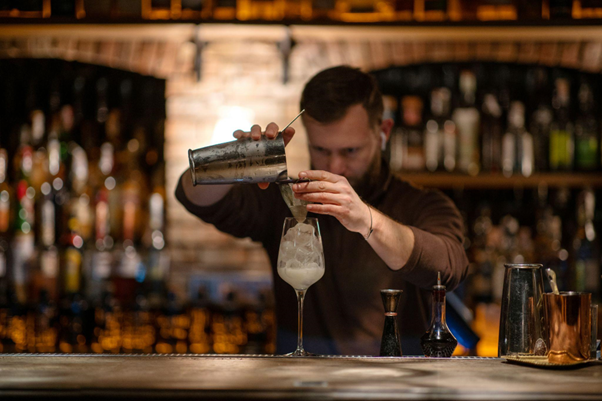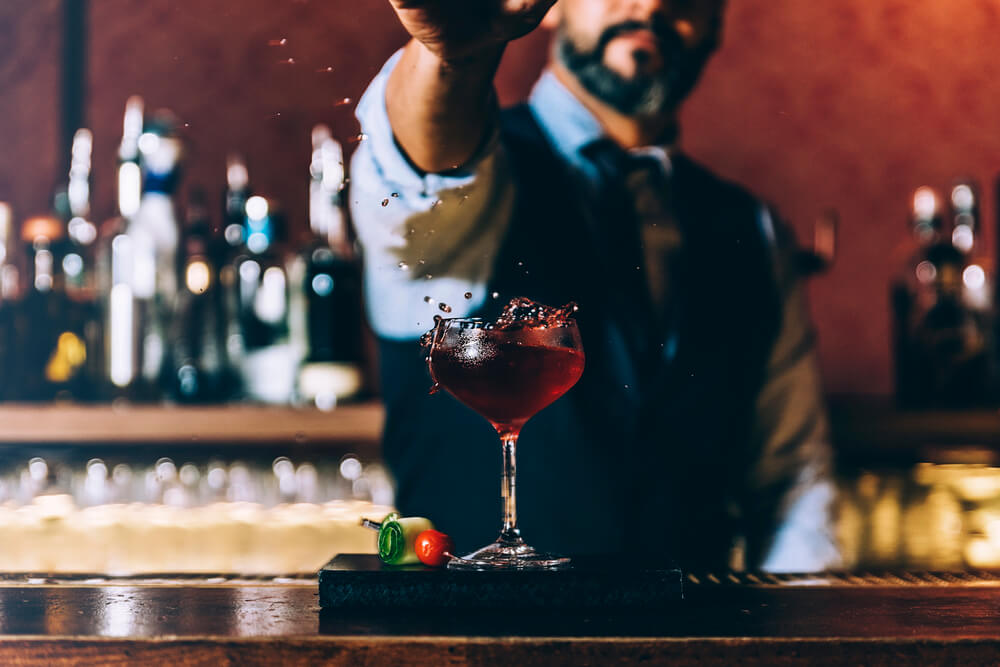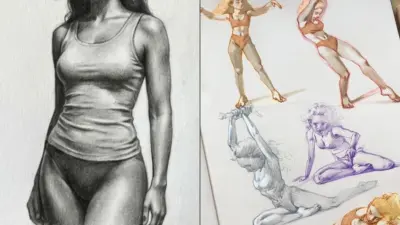Being a bartender is a fun, exciting, and well-paid profession. Bars have always been popular, but in the world with the Internet and online reviews, Instagram stories and TikToks, they are becoming an experience in both, online and offline communities.
Do you want to work in one of these popular bars? You read through the bartender job description but aren’t quite confident you’ll land the job?
This article will boost your confidence with valuable insights and real-life situations to make you the perfect fit for the job.

The Interview Preparations
Your interview is bigger than your first day on the job, This is why you need to focus on preparations (not only on your looks).
First of all, do your homework on the establishment: is it a cozy speakeasy, a bustling sports bar, or a chic cocktail lounge? Sites like Liquor.com can help you familiarize yourself with popular cocktail trends that might be relevant to the venue.
Next up is your resume. Keep it snappy and tailored—highlight relevant bartending experience, certifications (like TIPS alcohol training), and any customer service skills you’ve picked up. And don’t underestimate the power of good grooming; aim for a look that says, “I can charm customers all night but still handle a triple order of margaritas during happy hour.”
Common Questions and How to Answer Them
Here’s the deal: bartender interviews aren’t just about what you know; they’re about how you think on your feet. You’ll likely face a mix of classic and quirky questions.
Some typical ones include:
- “What’s your go-to cocktail, and how would you sell it to a customer?”
- “Ever dealt with a rowdy patron? How’d you handle it?”
- “What’s your philosophy on upselling?”
When answering, channel your inner mixologist and craft responses that are balanced: a splash of personality, a dash of professionalism, and a twist of humor. For instance, when talking about handling tricky customers, mention that you can diffuse tension faster than a shot of tequila goes down.

Pro tip: structure your answers using the STAR method (Situation, Task, Action, Result). It keeps you clear and concise.
“What’s your go-to cocktail, and how would you sell it to a customer?”
Here’s where you get to show off your creativity and storytelling skills. Let’s say your go-to is an Old Fashioned. You could say, “I’d describe it as a timeless classic—smooth bourbon with a touch of sweetness and a hint of citrus.
For customers, I’d paint a picture: ‘This drink is for someone who appreciates the finer things, a throwback to when cocktails were an art form.’” The goal here is to make the customer feel like they’re ordering more than a drink—they’re indulging in an experience.
“Ever dealt with a rowdy patron? How’d you handle it?”
Handling tough customers is part of the gig, so the key here is to show calmness under pressure.
For example, “One time, a customer was getting a little too loud after a few drinks. I kept my tone friendly but firm, saying, ‘Hey, we want everyone to have a good time here—let’s tone it down a bit, okay?’ If that doesn’t work, I’d loop in security or the manager to handle it professionally.” Show that you’re a problem-solver who knows when to escalate appropriately.
Skill Tests
Bartending is much more than just cracking jokes with customers or showing off your charm. It is a manual workforce job, if you leave aside the witt and charm. After all, you’ll be sipping expensive and exclusive spirits and beverages and mixing just the right amount of liquids to create the perfect cocktail, a trademark of your employer’s bar.

So, expect for a practical test of your skills on these interviews, as they are very common. These tests might include testing the steadiness of your hand while pouring drinks, shaking some common and popular cocktails and serving them, timing your work, or even blind-tasting a beverage to guess it.
Here’s the deal: practice is your best friend. Blind-taste a few spirits at home to hone your palate, and time yourself while making standard drinks—speed matters, but so does quality. Resources like Difford’s Guide are treasure troves for refining techniques and memorizing recipes.
Want to stand out even more? Try these tips:
- Perfect Your Pour: Accuracy is huge. Practice pouring 1.5-ounce shots using a jigger, then try free-pouring into a measuring cup to see how close you get. The goal is consistency.
- Master the Classics: Know how to make at least 5-10 essential cocktails like the Old Fashioned, Margarita, and Mojito. Confidence here shows you’ve got a solid foundation.
- Show Off Presentation Skills: Even a basic drink can wow with the right garnish or glassware. Practice those lemon twists and citrus peels—details matter.
- Stay Calm, Stay Cool: They’re watching how you handle pressure. If you drop a shaker or miss a step, recover smoothly with a smile. It’s less about perfection and more about poise.
- Ask for Feedback: If you’re given a task, don’t hesitate to ask, “How would you like it done?” It shows you care about meeting their expectations and are adaptable.
Personality and Customer Service Assessment
Yes, as mentioned previously, being a bartender is a beautiful harmony between doing the manual job just perfectly and having a character that is smooth, yet serious enough to be the person behind the bar.
Bars are hubs where spirits get poured and souls become naked. You might get into awkward situations, love triangles, drunk talk, and actually, being a psychologist on someone’s bad day. You have to handle these situations as part of the job and don’t become involved, just like any other job.
Also, you are not alone. You might have another bartender with you (depending on the size of the bar) and a few waiters. Teamwork is one of the most valued assets in any company culture, and it’s no different in a bar setting.
Here are some commonly demanded skills for bartenders:
- Exceptional Communication
- Adaptability
- Multi-Tasking
- Problem-Solving
- Creativity
If you’ve got these in your toolbox, you’re already halfway to becoming the heartbeat of any bar!
Questions You Should Ask the Employer
An interview isn’t a one-way street. Asking your potential employer thoughtful questions doesn’t just make you stand out; it also shows that you know your way around the industry. This is your chance to demonstrate that you’re thinking like someone who already works there.
Some bartender-smart questions to ask:
- “What’s the bar’s busiest shift, and how is it staffed?”
- “What’s the policy on regulars—are we encouraged to learn their preferences?”
- “Does the bar support bartenders experimenting with new cocktail recipes?”
These kinds of questions show you’re serious about stepping into the role and hitting the ground running.
Some Final Tips for Success on Interview Day
The big day has arrived, and it’s time to shine brighter than a freshly polished bar spoon. Here are some actionable tips to make sure you ace the interview:
- Arrive 10-15 Minutes Early: Punctuality shows professionalism and respect for the interviewer’s time. Use the extra minutes to observe the bar’s atmosphere, clientele, and vibe. This can also help you tailor your answers during the interview.
- Dress the Part: Strike a balance between professional and approachable. Aim for clean, stylish, and comfortable—think business casual with a touch of personality that hints at your flair behind the bar.
- Bring a Bartending Toolkit (If Appropriate): Some interviews include practical tests. Packing tools like a shaker, bar spoon, or jigger shows preparedness and pride in your craft. Even if they aren’t needed, it leaves a professional impression.
- Stay Upbeat and Personable: Your interviewer wants to see the energy you’ll bring to the bar. Smile, stay engaged, and let your personality shine. Remember, a bartender isn’t just a drink-maker—they’re often the life of the party.
- Demonstrate Active Listening: Pay close attention to questions and respond thoughtfully. Nod occasionally, ask clarifying questions if needed, and show you’re genuinely interested in the role.
- End with Gratitude and Enthusiasm: As you wrap up, thank the interviewer for their time and express your excitement about the opportunity. A simple but heartfelt “I’d love to bring my skills and passion to your team” can leave a lasting impression.
These small but impactful moves will help you come across as prepared, polished, and ready to take on the role.
- 4shares
- Facebook0
- Pinterest4
- Twitter0
- Reddit0



